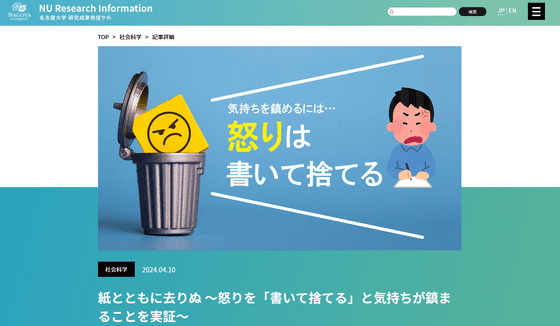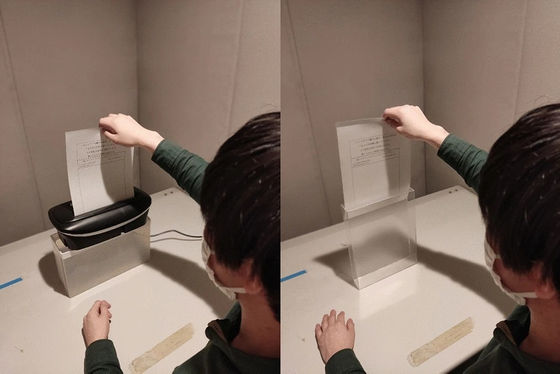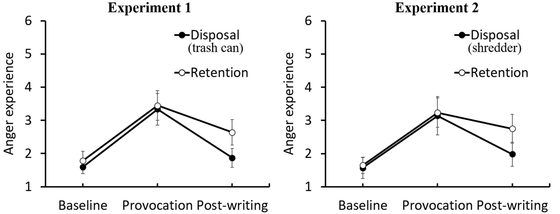A Japanese study has found that writing down your anger is better than letting it go, and that writing down your frustrations on paper and shredding it will make your anger disappear

Many people have probably had the experience of writing down their anger in a diary or posting it on social media. Researchers at Nagoya University have found that writing down the situation that made you angry on paper and then shredding the paper will almost completely remove that anger.
Anger is eliminated with the disposal of a paper written because of provocation | Scientific Reports
Gone with the paper - Proof that writing down and throwing away your anger calms you down - Nagoya University Research Results Information
https://www.nagoya-u.ac.jp/researchinfo/result/2024/04/post-649.html

Past research has suggested the effectiveness of the 'detachment' approach, which involves discarding objects associated with negative emotions, such as burning or tearing up mementos of a hated ex-lover to help people forget their anger toward the person they lost. However, no research has examined the simpler method of writing it down on paper and throwing it away.
In this study, Professor Kawai Nobuyuki of the Graduate School of Informatics at Nagoya University and Kanaya Yuta, who was a doctoral student at the time of the research, conducted an experiment to examine how anger changes when people write down situations that made them feel angry on paper and then throw them away.
The 50 university students who participated in the experiment were asked to write essays on social issues such as 'smoking in public places.' The research team then criticized the essays, giving them negative ratings and comments such as, 'I can't believe that an educated person would think like this. I hope this person learns something while he's in college.'
The subjects were then instructed to objectively write down the criticism they had received about their essay, and were then divided into two groups: one group shredded the paper and threw it away, and the other group kept it in a clear plastic case.

The subjects' emotions were then assessed using the Positive and Negative Affect Schedule (PANAS), and their anger was measured three times: before the experiment began, after the provocation, and after writing on the paper. The group that had gotten rid of the paper showed almost complete anger disappearance.
The graph below shows the progress of self-reported 'anger scores' assessed by the PANAS. The graph on the left is for 'Experiment 1,' in which participants crumpled up the paper and threw it in the trash, and the graph on the right is for 'Experiment 2,' in which participants shredded the paper. In both experiments, the group that disposed of the paper with the anger on it (Disposal) saw their anger decrease to the resting (Baseline) level, whereas the group that kept the paper (Retention) saw their anger not decrease as much.

Regarding these results, Professor Kawai commented, 'We expected that this method would help suppress anger to some extent, but we were surprised that anger was almost completely eliminated.'
The team believes that the calming effect of writing the anger down on paper and throwing it away may be related to a phenomenon known as 'backward magical contagion,' the belief that actions performed on objects associated with a person, such as hair, will affect that person.
In the field of cognitive science, psychological phenomena such as 'magic contagion,' in which cockroaches perceive food as dirty after passing nearby it, and 'celebrity contagion,' in which clothes worn by famous musicians are traded at high prices, have been confirmed. However, it seems that disposing of a piece of paper with anger written on it with your own hands may have the opposite effect.

A similar concept is the 'Hakidashi Sara' ritual at Kiyosu Sannou Hiyoshi Shrine in Aichi Prefecture, in which a plate containing emotions that one wants to throw away is broken.
'This technique, which allows people to easily control their anger at work and at home, may be useful in many everyday situations, such as parents managing their anger toward their children,' the research team wrote in the paper.
◆ Forum is currently open
A forum related to this article has been set up on the official GIGAZINE Discord server . Anyone can post freely, so please feel free to comment! If you do not have a Discord account, please refer to the account creation procedure article to create an account!
• Discord | 'How do you control your anger?' | GIGAZINE
https://discord.com/channels/1037961069903216680/1227909801439264839
Related Posts:
in Science, Posted by log1l_ks







